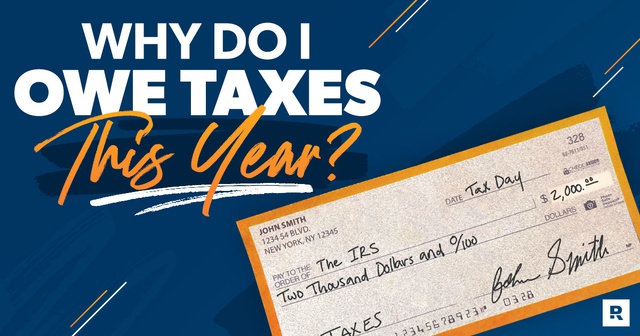
9 Key Reasons You Might Owe Money to the IRS (Photo: Ramsey Solutions)
Stay Ahead of Tax Liabilities with Expert Insights on Potential IRS Dues and Proactive Strategies for Tax Season 2024
As 2023 draws close, individuals are encouraged to proactively prepare for Tax Day to alleviate potential tax burdens and streamline their financial responsibilities. Cnet highlights that various factors can contribute to owing money to the IRS. These encompass changes in income, modification of withholding status on W-4 forms and engaging in freelance or small business activities, among others.
The 2024 tax filing season looms on the horizon, prompting the need for effective tax planning. Mark Steber, Chief Tax Information Officer at Jackson Hewitt, emphasizes the significance of early filing to determine tax liabilities. By filing early, individuals gain insight into their financial obligations, granting them sufficient time to devise strategies for handling tax payments.
READ ALSO: IRS Reveals A Real Holiday Miracle To Taxpayers!
Here are 9 reasons you might incur dues to the IRS:
- Changes in income during the year can affect tax liabilities, particularly if one enters a higher income tax bracket due to salary increments or additional sources of earnings.
- Tinkering with the withholding status on W-4 forms may lead to either underpayment or overpayment of taxes, necessitating periodic review and adjustment.
- Engaging in freelance work are considered self-employed and must file taxes as business owners, paying income taxes based on their bracket and a self-employment tax of 15.3%.
- Owning a small business carries the responsibility of self-employment taxes and estimated tax payments, imposing the need for thorough financial planning and compliance with tax regulations.
- Making early withdrawals from retirement accounts can incur a 10% income tax penalty and regular taxes.
- Payments received as unemployment benefits are subject to taxation, and recipients have the option to request tax withholdings or make estimated tax payments.
- Moving to a new state can result in higher tax obligations as individuals may need to file part-year resident tax returns in both their previous and new states of residence.
- Adjusting contributions to FSAs and HSAs affects taxable income, influencing payroll tax bills.
- If individuals no longer qualify for tax credits, they may need to repay the credits claimed, plus interest, emphasizing the need for ongoing awareness of tax credit eligibility.
Individuals need to heed these insights and undertake proactive tax management strategies to navigate the intricate landscape of tax liabilities and ensure a well-prepared approach towards the upcoming tax season.
READ ALSO: Find Out More About Property Tax Relief For Wichita’s Vulnerable Residents
























